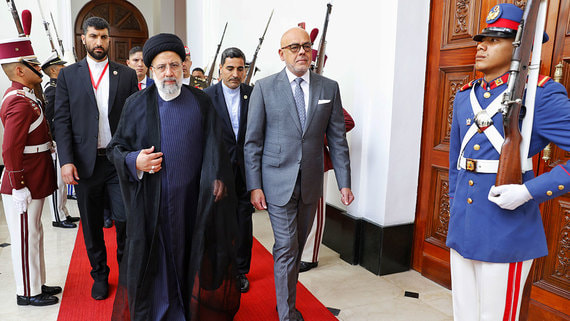Iranian President begins tour of Latin America from Venezuela
[ad_1]

On June 13, Venezuela and Iran signed a number of memorandums in the field of mining, petrochemistry, transport and agro-industrial complex. The signing of the documents, according to the Venezuelan state channel VTV, took place as part of the first tour of Iranian President Ibrahim Raisi in Latin America. The Iranian leader arrived in Venezuela on June 12 and held talks with President Nicolas Maduro. The parties agreed on cooperation in the field of technology, communications, higher education, culture, science, mining, the production of medicines and the supply of meat and livestock to Iran.
The Iranian leader’s trip, according to Tehran, corresponds to the “favorable” dynamics in the development of relations with the states of the region. As Raisi noted on June 12, political and trade ties with these countries are considered “strategic” and “friendly” in Iran. As part of the tour, the Iranian President will also visit Cuba and Nicaragua. According to Raisi, the trip is a response to the invitations of the leaders of these countries. According to the Iranian state agency ParsToday, the president is accompanied by a large delegation, including the ministers of defense, foreign affairs, oil, culture and health. Raisi’s itinerary basically coincides with the tour of Russian Foreign Minister Sergei Lavrov in the region in April 2023 (then, in addition to Brazil, he also visited Venezuela, Nicaragua and Cuba).
Energy cooperation between Venezuela and Iran was announced against the backdrop of Caracas’ problems with oil production. The country has the largest proven oil reserves in the world – 304 billion barrels. (Saudi Arabia – 298 billion barrels, USA – 69 billion barrels), but over the past 10 years, production has fallen by 75%. At the end of 2021, Venezuela ranked 25th in the world in terms of production (605,000 barrels per day). As of April 2023, according to OPEC, it has risen to 810,000 barrels. (the United States has 12.7 million barrels, according to the country’s Energy Information Administration). The reasons for Venezuela’s difficulties are the tough US sanctions, partially eased at the end of 2022, when the American Chevron and its subsidiaries were again allowed to produce oil and oil products in Venezuela and supply them to the United States.
Otkritie investitsy analyst Alexei Kokin estimates Venezuelan production in June at 700,000 bbl. per day. “Raisi’s visit should be viewed as a negotiation process between countries under sanctions, of which there are already so many that they can form some kind of economic association. But the United States signaled that negotiations between the Venezuelan authorities and the opposition could trigger the lifting or new easing of sanctions. Washington can use the country as a backup supply option in case of worsening relations with Saudi Arabia,” Kokin admits.
Iran’s experience in circumventing sanctions can be useful for Venezuela: Iran does not have the technology for heavy and extra-heavy Venezuelan oil, but it has a large fleet that can facilitate exports to Caracas, explains Viktor Kheyfets, professor at St Petersburg University. The situation with oil production in the country, Kheyfets continues, remains difficult not only because of the sanctions, but also because of the inefficient management of the industry by the military. To restore it, Venezuela needs at least $25-30 billion. Neither the United States nor Russia, much less Iran, can provide such funds. The latter, the expert adds, sees rather a political aspect in cooperation with Venezuela, demonstrating the ability to be active in different parts of the world.
Against the backdrop of sanctions pressure, Iran and Venezuela are drawing closer, the fuel and energy sector is no exception, says Igbal Guliyev, deputy director of the International Institute for Energy Policy and Diplomacy at MGIMO. Iran has already helped Venezuela in difficult times with oil products, he recalls. Tehran, taking into account the 40-year experience of existence under sanctions, can provide the country’s petrochemical industry with the condensate necessary to dilute super-heavy oil and catalysts for refineries, Guliyev said.
The political aspect dominates Raisi’s visit to Venezuela, says Sergey Demidenko, Associate Professor at the Institute of Social Sciences of the RANEPA. According to the expert, it is not worth counting on the implementation of the signed agreements in practice and bringing the parties to a new level of interaction. Demidenko believes that Venezuela cannot get the required oil production technologies from Iran. At the same time, Iran in the region repeats the logic of the actions of China and partly of Russia, such frequent contacts with the same counterparties structure a new conditional anti-American network in world politics, the expert concludes.
[ad_2]
Source link








